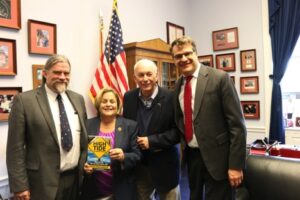ASA Participates in Sixth Climate Science Day
Steve Pierson, ASA Director of Science Policy

Photo by Emanuel Saavedra. Leonard Smith, Rep. Ileana Ros-Lehtinen (R-FL), Robert Corell, and Steve Pierson met to discuss climate science research and climate change impacts in February.
Two members of the ASA Advisory Committee on Climate Change Policy (ACCCP) participated in the sixth annual Climate Science Day (CSD) in February. Leonard Smith of the London School of Economics and Pembroke College, Oxford, completed his sixth CSD and Daniel Cooley of Colorado State University his first.
Smith and Cooley were among 22 scientists participating in 80 meetings with members of Congress or, more likely, their staff about their climate science research and climate change impacts possible for the state or congressional district. The participants, who were partnered with a scientist of another discipline for their day of meetings, also offered themselves as resources on any climate science questions.
Unlike most congressional visits days, CSD does not have a policy ask such as to support a certain bill or budget. Instead, the ask is that they consult one of the scientists or participating societies when they have a climate science question. For this year’s event, the message that science societies agree climate change is happening, with human activity being almost certainly the primary driver, was made more explicit. In the past, this message was implicit, with a 2009 letter signed by the heads of 18 science organizations included in the leave-behind packet.
CSD is sponsored and organized by the Climate Science Working Group, which is comprised of 20 professional associations and other scientific organizations. To prepare for the meetings, the participants heard from a variety of speakers—including two Senate staffers—the afternoon prior about the CSD message and how to conduct an effective meeting. The preparation has also traditionally included a climate science communications expert. This year’s expert, Katherine Hayhoe of Texas Tech University, gave her talk, “Talking Climate: Why Facts Are Not Enough,” by webinar.
Participants and the science society professionals noted two encouraging developments in the U.S. House of Representatives on climate change, which is generally a polarizing issue. One was the formation of the Bipartisan Climate Caucus, which was announced the day of the CSD briefing and headed by Rep. Carlos Curbelo (R-FL) and Rep. Ted Deutch (D-FL). Smith’s team met with staff for both offices and learned the new caucus plans to start out with four Republicans and four Democrats and emphasize informational briefings relating to climate change impacts. For any member to join the caucus, he or she will have to find a member of the other party with whom to join.
The other development was the 2015 Environmental Stewardship Resolution 424, sponsored by Rep. Chris Gibson (R-NY) and 11 fellow Republicans expressing “the commitment of the House of Representatives to work constructively on creating and supporting economically viable and broadly supported solutions to measured changes in global and regional climates.”
For more information about CSD, contact ASA Director of Science Policy Steve Pierson at pierson@amstat.org.

















